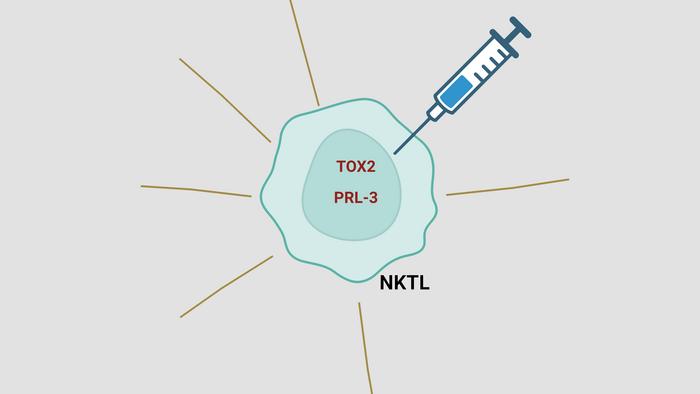Singapore, 29 May 2023 – A team of researchers from the Cancer Science Institute of Singapore (CSI Singapore) at the National University of Singapore (NUS) has discovered that a transcription factor, TOX2, was aberrantly increased in patients with Natural killer/T-cell lymphoma (NKTL). The increased TOX2 level leads to the growth and spread of NKTL, as well as the overproduction of PRL-3 – an oncogenic phosphatase that is a known key player in the survival and metastasis of several other types of cancers. This breakthrough discovery presents a potential novel therapeutic target to treat NKTL.

Credit: Illustrated by Dr Jianbiao Zhou
Singapore, 29 May 2023 – A team of researchers from the Cancer Science Institute of Singapore (CSI Singapore) at the National University of Singapore (NUS) has discovered that a transcription factor, TOX2, was aberrantly increased in patients with Natural killer/T-cell lymphoma (NKTL). The increased TOX2 level leads to the growth and spread of NKTL, as well as the overproduction of PRL-3 – an oncogenic phosphatase that is a known key player in the survival and metastasis of several other types of cancers. This breakthrough discovery presents a potential novel therapeutic target to treat NKTL.
NKTL is an Epstein-Barr virus (EBV) associated, aggressive non-Hodgkin lymphoma (NHL) with very poor treatment outcomes in the advanced stages. It is prevalent in Asia and Latin America but rare in Europe and North America. Combined radiation therapy and chemotherapy is the consensus standard therapy for NKTL patients, however, they are also often associated with high relapse rate and serious side effects. Thus, improved knowledge of the molecular mechanism leading to NKTL progression, as well as the development of novel targeted therapy strategies, has to be addressed urgently.
Professor Chng Wee Joo and Associate Professor Takaomi Sanda from CSI Singapore, along with Dr Ong Choon Kiat from Duke-NUS Medical School, reported their ground-breaking findings in a paper published in scientific journal Molecular Cancer on 10 April 2023. Collective efforts from Dr Jianbiao Zhou, Dr Tze-King Tan, Ms Sabrina Hui-Min Toh, Miss Sinan Xiong, and the rest of the team, have contributed to these pioneering revelations.
Their findings are also the first to show the involvement of TOX2 and PRL-3 in NKTL. These findings were validated in both cell lines and in a large set of patient tumour samples. In addition, the team analysed the clinical features of 42 NKTL cases in an independent cohort and found that TOX2 was not only overexpressed in NKTL primary tumours, but also negatively associated with patient survival.
Currently, there are no TOX2-specific inhibitors. As such, targeting TOX2, or its downstream PRL-3, could be a valuable therapeutic intervention for NKTL patients and warrants further study in the clinic.
Prof Chng, who is the co-lead author of the study, said, “We have now identified novel treatment targets, TOX2 and the downstream PRL3, in NKTL, where new treatment is greatly needed. We can use different strategies to target these. Proteolysis-targeting chimera (PROTAC) targeting TOX2 to degrade TOX2 protein may be a viable NKTL therapy option. A humanised antibody, PRL3-zumab, has been approved for Phase 2 clinical trials in Singapore, US, and China to treat all solid tumours. With our findings from this study, it is definitely timely to evaluate PRL3-zumab’s effect in patient with NKTL.”
“Overall, treatment for NKTL patients remains a challenge in the clinic. Novel insight into the molecular mechanisms of this disease would guide the development of effective targeted therapies to improve the survival of NKTL patients, especially for those refractory or relapsed cases,” said Dr Jianbiao Zhou from CSI Singapore, the first author of this study.
Moving forward, the group is currently testing novel agents for targeting TOX2 and PRL-3 in NKTL. The long-term goal is to bring these novel agents into clinical trials.
Journal
Molecular Cancer
DOI
10.1186/s12943-023-01767-1
Article Title
Super-enhancer-driven TOX2 mediates oncogenesis in Natural Killer/T Cell Lymphoma
Article Publication Date
10-Apr-2023




